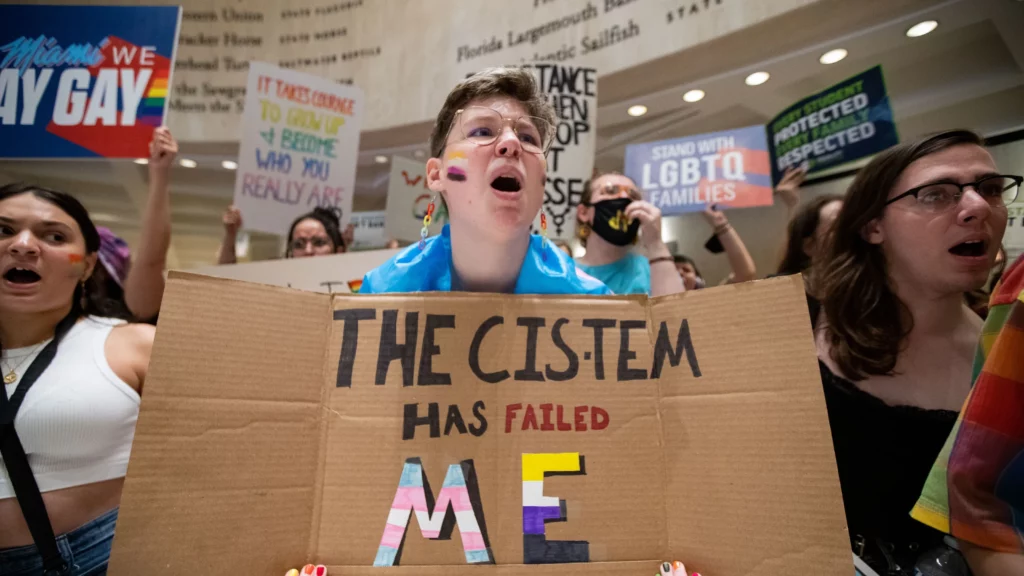Gender Ideology
We Will Be Blamed for Transgender Crimes
Several years ago, I watched a rage-fuelled protest unfold outside the Toronto Public Library. The feminist gender-critical advocate Megan Murphy had been invited to speak, and Canadian transgender activists treated this as an active threat to their very existence. Watching the mob shriek and threaten those attending an event featuring a speaker who holds progressive views on virtually every issue was deeply unsettling, and I wondered: If this is how much they hate someone who shares most of their worldview, how much do they hate the rest of us?
It was then, watching their contorted faces, that I realized that there is no scenario in which these people would ever admit that they are wrong. Envy is one of the most potent forms of hatred, and they will never be content to leave Christians alone to raise their families in peace. Even when the trans experiment comes crashing down—a process that has begun—even then, I suspect, they will come after us with a vengeance. When they find themselves impotent, infertile, physically and physiologically damaged, we will be blamed for their misery.
For many trans activists and trans-identified people, blaming the transgender movement will be out of the question. For several years, I’ve thought that many of them will seek to blame Christians and conservatives for the very fallout that we have been warning them of since the transgender phenomenon and the mass medicalization of gender dysphoric children began. They will blame us not only for campaigning against sex changes for children; they will blame us for the suffering of those who received these surgeries.
The optimistic view of the transgender movement’s trajectory is that the ideological bubble will pop as the trickle of de-transitioners telling their stories turns into a tidal wave and the medical professionals who perpetrated the damage are flooded with lawsuits. There are good reasons for this optimism, from the shift in many European countries away from the so-called “affirmative model” of prescribing puberty blockers and cross-sex hormones to significant lawsuits such as that of the UK’s Keira Bell.
But as I noted in a previous essay, there are many who will not be able to accept that they got it wrong on transgenderism, most notably the parents who ushered their children on the path to transition, putting them on drugs and signing them up for surgeries. There is another group, as well—the trans activists and medical professionals who pushed for and perpetrated these policies. For them, admitting that they are wrong is to confess culpability—and their radicalism will not permit this conclusion.
There are indications that some are already beginning to push this narrative. Dr. Helen Webberley, for example, is a doctor and the founder of GenderGP, a service that serves as a pipeline for trans-identified people—including minors—to begin the process of ‘transition.’ Webberley has been the subject of scandal in the past, having her medical license temporarily revoked for providing puberty blockers to children. She has been unapologetic and claims that her work is “life-saving.”
Recently, Webberley posted a statement to X (formerly Twitter) that indicates a shift in the narrative that trans activists will try to create around de-transitioners, who are doing tremendous damage to their movement and credibility with their personal testimonies. Webberley wrote:
Detransitioning isn’t the “I told you so!” moment that some would like us to think it is. When transgender people detransition, they’re not saying, “Oops, I made a mistake. I’ve changed my mind—I’m not transgender any more.” What actually happens, and I’ve personally seen occur many times in my career, is that trans people try living openly as their preferred gender, and the discrimination, hate, and abuse they receive isn’t worth it. They are still transgender at heart.
But life as an openly trans person can be hard. And after living in a world that shows them nothing but abuse, discrimination, and hate, it’s often easier just to go back to living as a trans person in secret. Detransitioning doesn’t mean they’re not transgender. It means that their transition was regretful. And that regret is due to today’s society. Detransition rates should NEVER be used when debating trans rights. Trans people aren’t changing their minds; they’re choosing the safest option to survive in a world that might refuse to welcome them.
READ THE REST OF THIS COLUMN AT THE EUROPEAN CONSERVATIVE








